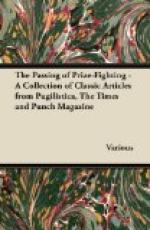The strife had waxed fast and furious and eventually had taken on a personal tone, the editor of La Muera accusing the editor of the English paper of being “that lowest of all living things—a Texan.” It will be remembered that in times gone by the State of Texas decided to desert its Latin parents and roost under the shadow of the eagle’s wing, thereby earning for itself prosperity and an evil reputation—in certain quarters.
McTavish’s editorial reply was a gem of satire and displayed an intimate knowledge of the antecedents of the rival editor.
At that time duelling was still prevalent, and it was not many days before the editorial sanctum of The Tribune was honoured by the visit of two officers in full-dress uniform.
The eventual outcome of their visit was that Mr. McTavish found himself pledged to fight a duel with a man who was, among other things, a first-class pistol shot and exceptionally expert with the “florette,” all of which McTavish was not.
The affair looked particularly unpleasant—to McTavish, who was short, fat, and by no means young. But the dignity of the foreign population as represented by the editor of The Killemalivo Tribune must of necessity be upheld.
Faced by this quite unusual difficulty, McTavish bethought him of his old and tried friend, General O’Flynnone, an Irish-American of many years’ residence in the Latin Americas. No one seemed to know his real name, and the title of General had come to him from his last place.
The General was delighted at the turn of events, agreed to be McTavish’s second, and promised to get him through the affair with a whole skin and no loss of honour.
As the challenged party McTavish had choice of weapons, which was the crux of the situation, as the General pointed out.
Among the Killemalivo aristocracy the favourite weapons were the duelling pistol and the “florette,” or rapier. The “pelado,” or lower orders, preferred the “lingua de vaca,” which means literally “cow’s tongue,” a nasty-looking knife of no mean proportions.
As O’Flynnone explained, the duel would have to be fought with “killing weapons”; nothing else would satisfy the bloodthirsty editor. Meanwhile he would think on the matter, and he advised McTavish to do likewise.
The following were the most unpleasant days of his life, as McTavish confessed afterwards. He was not a “conscientious objector,” but he had no pressing wish to exterminate his opponent, as that would have necessitated a sudden and forcible exile from the land of his adoption; still less did he fancy an early demise in the interests of his paper.
Meanwhile the General visited the rival editor’s seconds and arranged for a meeting in his own rooms to discuss final conditions.
O’Flynnone’s rooms contained, among other things, a collection of curious and ancient weapons. The walls were decorated with all sorts and conditions of strange and barbarous instruments of slaughter; Zulu assegais, Afghan knives and Burmese swords hung in savage array.




